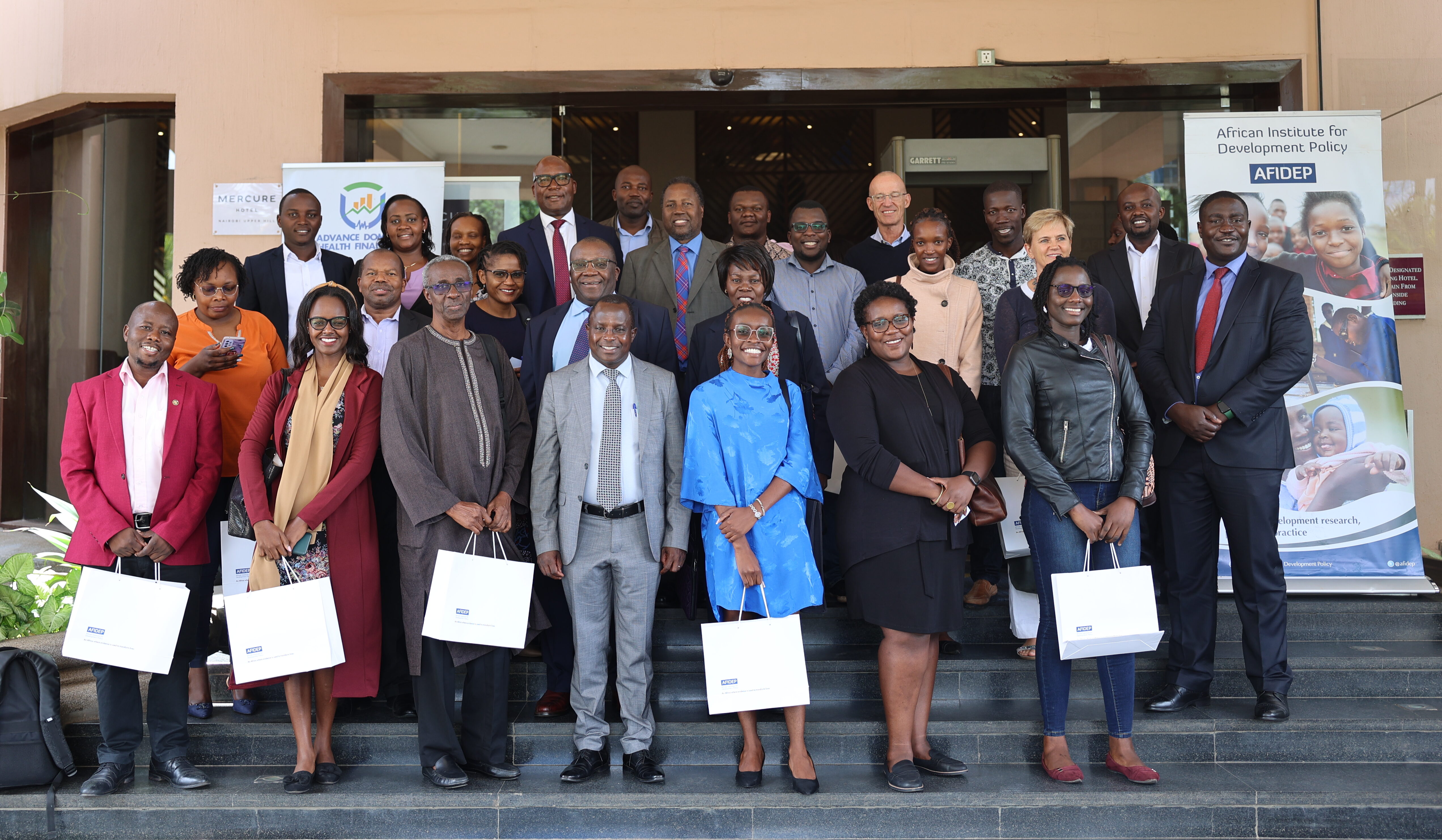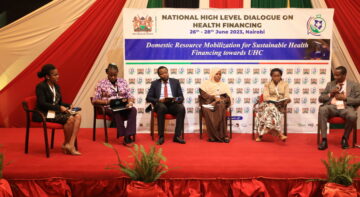News

Health is seen as crucial for sustainable development, both globally and in Africa. There is growing pressure on African governments to meet their commitments of increasing allocations to health and addressing spending inefficiencies in health budgets.
On 23 March 2023, the African Institute for Development Policy (AFIDEP) hosted a policy dialogue to deliberate concrete actions that Kenya needs to take to optimise domestic financing for health, which is critical for accelerating progress towards the realisation of universal health coverage (UHC). The dialogue convened key stakeholders, including the Ministry of Health, the council of governors (CoG), legislators, development partners, civil society organisations, youth organisations, and the media. The stakeholders in attendance outlined innovations and pathways for Kenya to mobilise more domestic resources for health and increase the effectiveness and efficiency of the country’s health budget.
In her opening remarks, Dr Rose Oronje, AFIDEP’s Kenya Country Director, underscored the need for Kenya to proactively innovate in health financing, emphasising the importance of data-driven planning to make the case for increasing domestic investment in health, especially for reproductive, maternal, newborn, child and adolescent health (RMNCAH). She noted that AFIDEP is working with stakeholders to provide the support needed to enable the national and county governments to leverage domestic resources for health
Health is at the top of Kenya’s political agenda. This is evident through the global, regional and national commitments that the country has made towards UHC and financing for health, including the commitment to achieving 17 Sustainable Development Goals (SDGs) by 2030; ratifying the Abuja Declaration to allocate 15% of the general government budget to health; and the Africa Leadership Meeting (ALM) Declaration calling for increased investments in health and efficient use of health resources to achieve an effective health system.
Kenya has made significant political and policy progress towards investment in health. The country’s health financing roadmap is stipulated in the Kenya Health Financing Strategy 2020-2030 that seeks to ‘ensure adequacy, efficiency and fairness in the financing of health services in a manner that guarantees all Kenyans access to the essential high-quality health services that they require.’ Despite political and policy commitments towards the realisation of UHC, Kenya’s investments to health remain sub-optimal, far below the Abuja Declaration of 15% of general budget, and the WHO-recommended 5% of GDP. Efforts should thus be made to ensure that health remains a priority even as the government addresses the (global) economic downturn, post-pandemic economic recovery, and huge public debt.
Dr Jackson Otieno, Senior Research and Policy Analyst at AFIDEP, noted that in addition to low investments in health, Kenya’s proportion of health expenditure on curative care is higher (67%) than on promotive and preventive care; there is a high level of out-of-pocket expenditure (24%); as well as low rates of utilisation of health budgets (70% at national level and 91% at county level for the 2019/2020 financial year).
He highlighted the urgent need for Kenya to establish innovative and sustainable health financing mechanisms drawing from tax revenue and expanding insurance coverage so that more Kenyans have access to health regardless of their ability to pay. He also noted the need for reforms that create an enabling environment for public-private partnerships in health underpinned by equity; strengthening data generation, analysis and use in informing health financing decisions; and sustaining evidence-based advocacy for domestic health financing.
While giving the keynote address, Dr Daniel Mwai, Kenya’s Presidential Advisor on Health Financing, outlined options the country needs to consider if it is to realise its commitment to strengthening primary healthcare (PHC) as a pathway to realising UHC. “Financing is NOT just about raising more money. It is also about how we strategically use this money to address persisting health challenges,” said Dr Mwai. He further noted that in improving domestic health financing to transform lives, stakeholders should invest heavily in disease prevention as well in lower-level health facilities that focus on PHC.
Kenya’s Ministry of Health (MoH) has established Primary Health Care Networks (PCNs) to be an integral part of primary healthcare (PHC). PCNs are implemented through a hub and spoke model, wherein the hub is a PHC referral facility (level 4) and the spokes are lower-level PHC facilities (level 2 and 3 facilities – dispensaries and health centres), and level 1 community health units. This model emphasises the needs of the population, with the community as the entry-level to the health system.
Dr Mohamud Mohammed, the head of the PHC division at Kenya’s MoH, outlined how PCNs can form a key building block for scaling up UHC in Kenya by providing person-centred services closer to communities in need and guaranteeing quality, continuity, and sustainability of healthcare. PCNs seek to increase the effectiveness and efficiency of PHC services, particularly for people at risk of poor health outcomes. As such, each PCN is accountable for delivering PHC services while using resources in its specific geographic area, including finances. Financing PHC through the hub and spoke model with PCNs can take advantage of pooling and efficiency to improve purchasing of services.
The urgent need for Kenya to finance PHC was driven home by Felix Murira from Think Well who noted that the level 2 and 3 health facilities in Kenya receive very little financing. He noted that unless the country increases financing to these critical levels of the PHC, little progress will made towards UHC.
Speaking on the success story of Laikipia County towards health financing, Albert Taiti, County Executive Committee Member (CECM) for Health, noted that the main driver of progress in the county has been the political goodwill, which has resulted in improved budgetary allocation towards health services. The county government spends 46% of its resources on health, which is way above the average annual county allocations as a proportion of county budgets (29.2% in 2020/21). Additionally, the county ranked top in the uptake of the National Health Insurance Fund (NHIF), with 70% of its population enrolled on the cover. However, this uptake has seen a drop to about 55%, partly due low number of matching health facilities offering NHIF services.
In his remarks at the dialogue, Robert Rapando from the CoG Secretariat noted that counties through the CoG are working on reforms to ring-fence revenues from health facilities so that these can be invested back into health. He noted that while this effort is opposed by Treasury, it remains one of the most feasible ways counties will be able to increase domestic financing to health. He appealed for improved governance and leadership for health and noted the need to strengthen capacities at county level, all of which could greatly enhance domestic financing for health.
In his closing remarks, Dr John Mudany, AFIDEP’s board member, noted that such dialogues must continue to be a catalyst to inform decision-making to improve the health of the people. He emphasised that AFIDEP is ready to advance the translation of research and evidence to support the government’s translation of its policy commitments into tangible actions needed to benefit Kenyans
Related Posts





